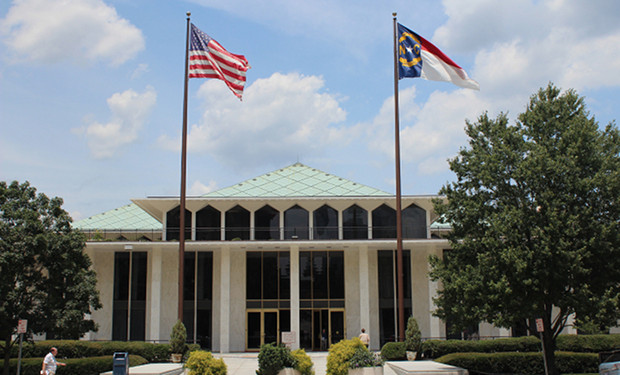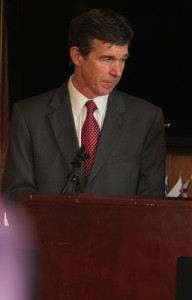Legislative Overstepping v. Protecting North Carolina’s Interests: How North Carolina’s Health Care Transparency Law Changed the Allocation of Power in the State Government
An in-depth analysis of how the Health Care Transparency law upset the balance of power within the state and created problems regarding who represents North Carolina.
Legislatures make the law. The Executive Branch executes the law. The Judiciary interprets and applies the law. This simple division of government was set up by the Founding Fathers centuries ago to protect against the dangers commonly associated with tyranny. Save for minor deviations, each state has followed the Federal Government’s Constitutional model with regard to separating domestic power. North Carolina is no different. All of the state government’s power is derived from the people. Then, the power is allocated to each respective branch according to the North Carolina Constitution.
A system of checks and balances precludes one branch from taking more than its fair share of the “power pie.” A combination of self-restraint and the political tools of the respective branches keeps the system intact. However, this system takes time to fix problems. Seldom does change come over night. Currently, the division of power in the North Carolina State Government is skewed. There is a chance that the system will fix the problem and with all due time, the allocation of power will be back to normal. However, this is unlikely and the current situation is likely to be the new status quo.
In the summer of 2013, North Carolina Republican lawmakers passed a health care transparency act. The bill contained a clause that creates standing for the Speaker of the House and the President Pro Tempore, on behalf of the General Assembly, to intervene whenever there is a challenge to the North Carolina Constitution or a statute. On its face, the law is ordinary and plain. In passing the bill, however, the General Assembly usurped power from the Executive Branch.
Traditionally and by Constitutional Provision, the Attorney General is exclusively charged with representing North Carolina interests in court. The standing provision took away the Attorney General’s exclusive ability to represent the interests of the North Carolinian people in court by giving the General Assembly standing to intervene in lawsuits.
The Executive was granted this broad power to represent the interests of North Carolina in faithfully executing the laws created by the legislature, until everything changed in August 2013.
A firm understanding of the political system created by the North Carolina Constitution is essential to understanding how the health care transparency bill changed the political structure for the foreseeable future. Article II of the North Carolina Constitution lays out the rules that govern the state legislature. The very first section of Article II states, “the legislative power of the State shall be vested in the General Assembly, which shall consist of a Senate and a House of Representatives.” This law-making authority, via either house of the General Assembly, permits these elected officials to affect substantive changes in the lives of its citizenry as long as the law is not contrary to either the United States or North Carolina Constitution. Scholars of state and local government have a popular saying that “The Legislature is king.” Notwithstanding any distasteful references to a monarchy, this statement is true for all intents and purposes.
The Executive, which includes an individually elected Attorney General, defends the laws and interests of North Carolina in court. The Attorney General and his subordinates are granted broad discretion in determining whether to file charges or take a case. This power is inherent in the nature of the Executive branch. This discretion is essential in bringing the human element of the law into the execution of such. The Attorneys General can nolle prosequi a case that is not worth pursuing. For example, a citizen may be charged for trespassing on government property while peacefully protesting. The citizen has the right to appeal the case. Assuming that he does, the attorney general and its subordinates have the power to prosecute or noelle prosequi the case. Regardless of how the Attorney General comes to the decision to prosecute or not, this discretion is within the purview of the Executive. The Executive was granted this broad power to represent the interests of North Carolina in faithfully executing the laws created by the legislature, until everything changed in August 2013.
The role of the Judiciary is to interpret the law, apply it, and check the respective powers of the other two branches. Separation of powers is evident from the very first constitutional provision involving the Judiciary. The creators of the state constitution must have found separation of powers to be important so as to mention a limit on the General Assembly’s power in the very instrument that creates the judicial branch. Ultimately, this branch of government is both an arena in which citizens can seek relief from any wrongs they have experienced and an arena for the State, as a whole, to punish those who have committed legal wrongs.
Attached to the health care bill is a provision that drastically changed the balance of the power within the three branches of government.
Prior to 2010, the Republican Party of North Carolina had not held control of both houses of the Legislature since 1896. The summer of 2013 was one of political change in North Carolina. Republicans, eager to make changes after finally gaining power, did not waste time asserting their power. On August 12, 2013, Governor McCrory signed into law a bill that created many voting restrictions. Prior to the bill becoming law, Attorney General Roy Cooper, a Democrat, sent the governor a memo “urging him to veto” several provisions of the law which Cooper deemed to be inadvisable and would likely be challenged in lawsuits. Nevertheless, Governor McCrory signed the bill into law. Cooper again expressed his discontent with the law by issuing another statement after the bill was passed.
Unfortunately, this opened Pandora’s box. Many people in the state government questioned Attorney General Cooper’s ability to execute the law and to represent North Carolina in its legal battles in support of the law; though, it is perfectly within the Attorney General’s statutory power to issue opinions about the law. Bob McStephens, McCrory’s chief legal counsel, said, “I was concerned then and I am concerned today that comments he has made that have been critical of this legislation has compromised his ability to represent the state of North Carolina.” Cooper countered, stating, “it is his duty as both an elected official and legal professional to vigorously defend the state, even if he personally disagrees with arguments made by his office in court.” This general distrust of Attorney General Cooper’s ability to defend the law leads us to the passage of the health care transparency law.
In the late hours of the Legislature’s long session in 2013, the Legislature passed a health care transparency bill. Attached to the health care bill is a provision that drastically changed the balance of the power within the three branches of government. Included in the bill was a provision, which reads:
The Speaker of the House of Representatives and the President Pro Tempore of the Senate, as agents of the State, shall jointly have standing to intervene on behalf of the General Assembly as a party in any judicial proceeding challenging a North Carolina statute or provision of the North Carolina Constitution.
In other words, a provision that changed the landscape of North Carolina governmental powers was hidden within a bill regulating health care. Many argue, and rightfully so, that the law was passed in an undesirable fashion. The bill was passed at the end of the legislative term and was hidden within a law that regulates health care. However, the Legislature followed the requisite procedures in passage of the bill and it was passed according to law.

Gov. McCrory, NC DOT Sec. Tata, President Pro Tempore Berger, Speaker of the House Tillis at a NCDOT Event, Photo Courtesy of NCDOT (Flickr)
In effect, this law creates an offset in the balance of power within the state government. 1 What was previously left to the executive via the Attorney General, is now delegated to the Speaker of the House and the President Pro Tempore. Because this law took effect October 1, 2013, there have been no known challenges to this provision. 2
The difficult question is “who is going to represent the people of North Carolina in court?”
The question of “who is the client?” is riddled throughout the legal profession. For government attorneys, in particular, the question is ever-present. Are the citizens of North Carolina the client? Is the governor the client? Is it the particular department for which one works? In the present case, it is easy to identify the client: anyone who is adversely affected by a North Carolina Constitutional provision or law. Rather, the difficult question is “who is going to represent the people of North Carolina in court?”
Prior to the passage of the health care transparency law, the answer was simple: the attorney general. Currently, the answer is muddled because the Speaker and the President Pro Tempore now have standing to do so as well. An examination of Hollingsworth v. Perry, a widely publicized Supreme Court case, provides an excellent comparison to the current situation in North Carolina and how North Carolina’s standing provision may have been useful in California.
The Supreme Court decided that because the proponents of Proposition 8 had no authority to enforce the initiative, they therefore lacked standing to intervene.
During November 2008, California’s electorate voted to adopt Proposition 8, a constitutional amendment that prohibited same-sex couples from obtaining marriage licenses. In subsequent litigation, two same-sex couples filed a lawsuit contending that Proposition 8 was unconstitutional. The plaintiffs named California’s Governor, along with other government officials who were charged with enforcing the law, as defendants in the case. After losing in federal district court, the government officials declined to appeal the case. The proponents of the initiative, having lost the protection of the very officials that are charged with enforcing the law without regard to their personal distaste for it, appealed the case. After much litigation, the Supreme Court of the United States agreed to hear the question:
Whether under Article II, Section 8 of the California Constitution . . . the official proponents of an initiative measure possess either a particularized interest in the initiative’s validity or the authority to assert the State’s interest in the initiative’s validity . . . when the public officials charged with that duty refuse to do so.
The Supreme Court decided that because the proponents of Proposition 8 had no authority to enforce the initiative, they therefore lacked standing to intervene. Essentially, the proponents of the bill had no legal recourse to enforce a properly enacted constitutional provision. Rather, the only recourse that the proponents had was to elect public officials that would enforce the law.
Whether one agrees or disagrees with the merits of a case, it is hardly debatable that those who are charged with executing the law should do so. In the present case, North Carolina Republicans, whether consciously or not, provided an avenue in which similarly situated individuals as the proponents of Proposition 8 would be granted an entry into the courts if a public official facts to execute laws.
These lawmakers did not want to see the law they spent time and effort creating fall into an empty abyss of words with nothing to give them meaning.
Consider the fact scenario in the Hollingsworth case as if it were taking place in North Carolina. These individuals sue the Governor and other public officials charged with executing the law. Proponents of the successful constitutional amendment, via a referendum, are forced to place their trust in the Governor and the other public officials to faithfully execute and defend the law. Despite this responsibility, the public officials choose not to defend the law. The proponents of the constitutional amendment are left with no legal recourse.
This is the precise situation that the lawmakers sought to avoid when creating the standing law. Lawmakers were aware of Attorney General Cooper’s strong distaste for the Voter ID Bill. They spent their time and effort creating a law that they wanted to be faithfully enforced. These lawmakers did not want to see the law fall into an empty abyss of words with nothing to give them meaning.
Creating more opportunities to intervene does not guarantee that these government officials will in fact do so.
In order to avoid this unacceptable—albeit foreseeable—result, the lawmakers granted standing to the Speaker of the House and the President Pro Tempore. These lawmakers can argue that the Hollingsworth situation, in which citizens were left without legal recourse, will not occur in North Carolina. Even if an attorney general refuses to enforce a law, citizens can petition their Speaker or President Pro Tempore to intervene. In essence, these lawmakers have been able to provide their citizens with legal recourse that will not be available in other states.
This argument is not without flaws. Creating standing for more government actors does not guarantee representation. For example, in the Hollingsworth case, there were many government actors that could have defended and enforced the law. They simply declined to do so. Would this result have been the same if California’s Speaker of the House and President Pro Tempore had standing to intervene? Maybe, maybe not. Creating more opportunities to intervene does not guarantee that these government officials will in fact do so. This law does not necessarily protect against the harms that it seeks to address, at the expense of eroding the balance of power between the respective branches of government. Therefore, the potential solutions that the law seeks to create do not justify the problems that it creates.
The question of who represents North Carolina is not answered by this law.
Hypothetically, North Carolina could be represented on both sides of a case. The Attorney General could be on one side and the Speaker of the House and President Pro Tempore could be on the other. If the case gets to the appellate level, there is a possibility that the aforementioned government officials could be filing briefs, amicus briefs, and other documents as party opponents. Is this really in the state’s best interest? Certainly the proponents of the law did not intend for North Carolina to be party opponents in litigation. Ultimately, this law tends to create more problems than it solves.
In a perfect world, the General Assembly would abolish the law.
As for solutions, the simplest and possibly easiest fix to the problem is to eliminate the standing provision. This would balance the power between the branches of government. The balance of power would revert back to levels that the state enjoyed for the past 200 years. Furthermore, the General Assembly would maintain its status as “king” while guarding against the slippery slope towards tyranny in which one party imposes its will upon the state. This simple formula for government, which evidently is taken for granted, provides the best model for representation within the state and should not be abandoned but for the most extreme circumstances.
Alternatively, if the General Assembly is concerned that the Attorney General will not “faithfully execute” the laws and desires to create a level of protection for the people, then the standing provision should reflect such sentiment. A simple fix to the issue of unbalanced power would be to limit the scope of the bill to cases in which the attorney general refuses or neglects to “faithfully execute” the laws. This would grant the people another layer of protection when public officials fail to defend laws.
In other words, this would prevent the unfortunate situation in the Hollingsworth case in which the proponents of a law had no legal recourse when the public officials that were charged with defending a law failed to do so. Furthermore, this change in the law would prevent cumulative litigation and reduce the costs related in such because the Speaker and President Pro Tempore would only be able to intervene under this specific scenario. In effect, this law would provide the assistance that the General Assembly sought to provide without completely eroding the balance of power within the state while being relatively cost-effective.
Unfortunately, this scenario is unlikely to occur. A change of this magnitude requires the General Assembly to give up a power that it just acquired, which is contrary to the legislature’s self-interest. Also, there are many other pressing issues with greater political significance than standing. Members of the General Assembly do not get elected over their decision to vote on a standing provision in a health care transparency bill. Rather, they get elected because they provide much needed resources to their respective constituencies. There is no incentive to change the bill and without such an incentive, change is unlikely to occur. While this solution may be an effective change, it is unlikely to occur.
All things considered, there is much to learn from the passage of the health care transparency bill. Scholars and practitioners alike should monitor this situation in Raleigh in order to fully comprehend the effects of this law. It is certainly not newsworthy that the General Assembly allocated itself more power. However, it is important to note when the legislature usurps the power of another branch of government. In a perfect world, the General Assembly would abolish the law. They could also limit its scope to the intended purpose of the bill. Nevertheless, this is highly unlikely and a new status quo will emerge in terms of the balance of power in North Carolina politics.







